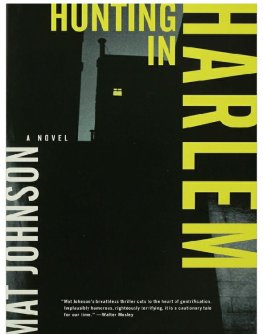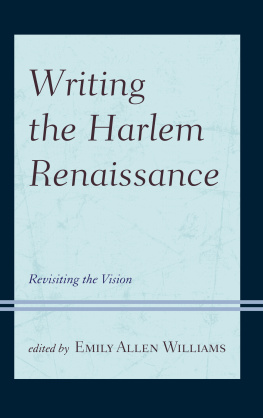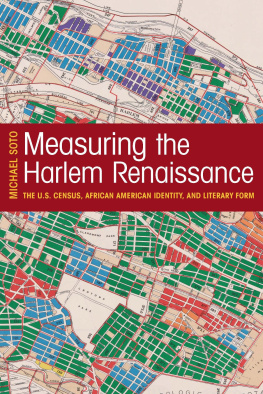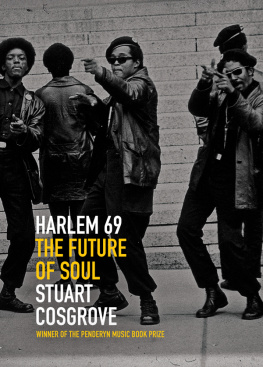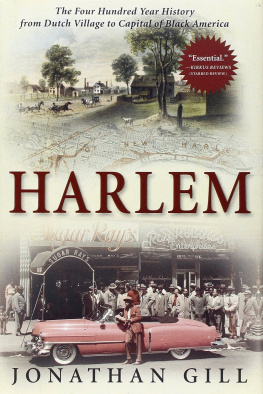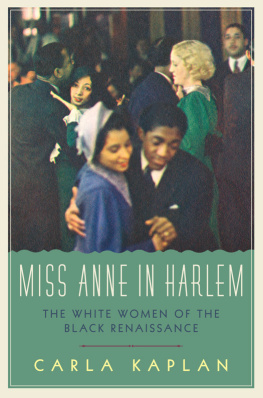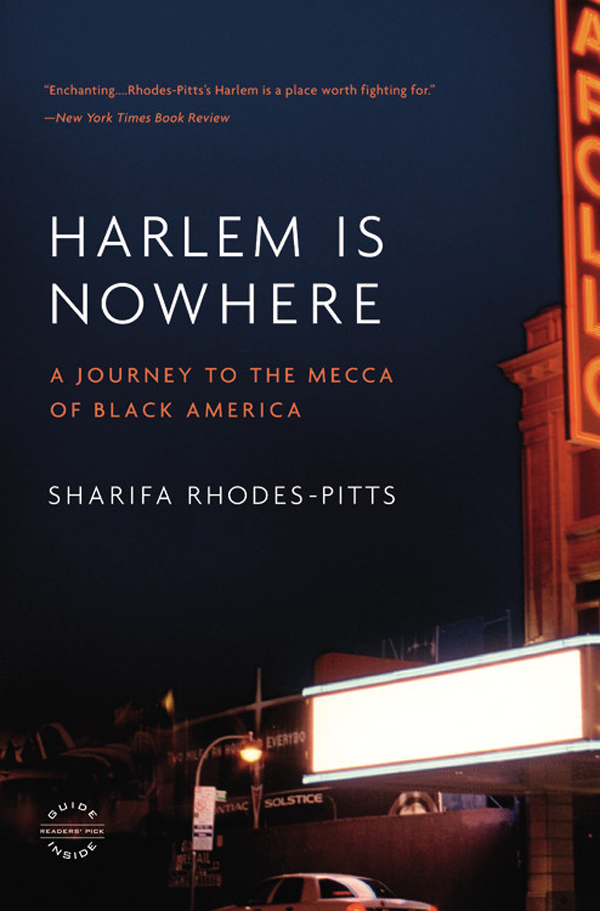In accordance with the U.S. Copyright Act of 1976, the scanning, uploading, and electronic sharing of any part of this book without the permission of the publisher constitute unlawful piracy and theft of the authors intellectual property. If you would like to use material from the book (other than for review purposes), prior written permission must be obtained by contacting the publisher at permissions@hbgusa.com. Thank you for your support of the authors rights.
Thank you for buying this e-book, published by Hachette Digital.
To receive special offers, bonus content, and news about our latest e-books and apps, sign up for our newsletter.
Sign Up
Or visit us at hachettebookgroup.com/newsletters
Copyright 2011 by Sharifa Rhodes-Pitts
Reading group guide copyright 2013 by Sharifa Rhodes-Pitts and Little, Brown and Company
Cover design by Nneka Bennett
Cover photograph by Geraint Lewis / Alamy
Cover copyright 2013 by Hachette Book Group, Inc.
All rights reserved. In accordance with the U.S. Copyright Act of 1976, the scanning, uploading, and electronic sharing of any part of this book without the permission of the publisher constitute unlawful piracy and theft of the authors intellectual property. If you would like to use material from the book (other than for review purposes), prior written permission must be obtained by contacting the publisher at permissions@hbgusa.com. Thank you for your support of the authors rights.
Little, Brown and Company
Hachette Book Group
237 Park Avenue, New York, NY 10017
littlebrown.com
twitter.com/littlebrown
First e-book edition: January 2011
The publisher is not responsible for websites (or their content) that are not owned by the publisher.
Permissions appear .
The Hachette Speakers Bureau provides a wide range of authors for speaking events. To find out more, go to hachettespeakersbureau.com or call (866) 376-6591.
ISBN 978-0-316-04033-4
Extraordinary acclaim for Sharifa Rhodes-Pittss
HARLEM IS NOWHERE
For the books author, Sharifa Rhodes-Pitts, Harlem is a notional place, an idea threatened by a reality, existing most concretely in the minds of those who have loved and defended it. Rhodes-Pitts is one such, and her account of this stretch of land that may or may not begin at 110th Street and end at 168th is fittingly idiosyncratic, as much meditation as history. Like Virginia Woolf, Rhodes-Pitts is bookish and devoted, interested in everyday matters: how people walk and talk, dress, go about their day. Here individual experience is honored, and judgment reserved. This is a lovely book about the romanceand dangersof bibliophily. No geographic or racial qualification guarantees a writer her subject. Only interest, knowledge, and love will do thatall of which this book displays in abundance.
Zadie Smith, Harpers Magazine
Harlem Is Nowhere is a tender, improvisational memoir of several years spent exploring the myths of this capital of African America and the realities of its twenty-first-century incarnation. It is a pilgrimage, a celebration, and a cautionary note. It also heralds the arrival of a writer whose voice fits right in with the literary forebears she reveres.
Jane Ciabattari, NPR.com
Enchanting. Rhodes-Pitts respects her interlocutors right to opacity while affirming the importance of their stories. Her Harlem is a place worth fighting for. It is a place more endangered than dangerousa blank, disavowed place bursting with the best stories never told. It is anything and everything but nowhere.
Kaiama Glover, New York Times Book Review
By weaving the past and the present together, Rhodes-Pitts reveals, even to those who may have never ventured into Harlem, why it is a place of dreams and why it endures. And, most important, she pushes her readers to explore the books and writers that made Harlem such a place of imagination and memory. For a reader like me, it just doesnt get any better.
W. Ralph Eubanks, National Public Radio
Sharifa Rhodes-Pitts is a gifted young writer.
USA Today
A fine debut. Like a young Joan Didion, Rhodes-Pitts stands in the corner with her notebook out. And, as with Didion, the thread keeping these disparate scraps together is her singular voice. Even if you know the neighborhood, it is rewarding to return here with her eyes, which are certain to reveal something new, and perhaps something decent, about the place. Unlike Didionor Ellisonshe is never cruel.
Thomas Chatterton Williams, American Scholar
Affecting. Rhodes-Pitts evokes her adopted Harlem in all its thwarted intensity.
Edward Kosner, Wall Street Journal
Harlem, once walled off by geography, then closed again by the dark will of the country, opens like a light to take its proper place at the center of the American spirit. Sharifa Rhodes-Pitts has given us a guidebook for this kind of remembrance. Her book is not so much a history of Harlem as a kind of memoir of history. In its account of one persons ascent up the imposing hill of centuries of Harlems stories, we have an example of how to read ourselves into the neighborhood, of how to think and how to believe when we rise out of the 125th Street station and into the bright heart of black America.
David Kennedy Jones, T: The New York Times Style Magazine
Harlem Is Nowhere is a dazzling series of linked essays on Harlem as the living embodiment of a place and time that might somehow mend the fractured history of African Americans and make it whole. Rhodes-Pitts honors the dreamers imagining what Harlem could be, while never losing sight of how each of them was thwarted by the disconnect between the heaven they envisioned and the reality they lived. It is her ability to not only see Harlem on its own terms but also grasp why Harlem matters that makes this book so exceptional. Rhodes-Pitts has the sharp eye of a reporter in prose, reminiscent of Joan Didion, that manages to be both remarkably cool and distinctly elegiac. She is walking toward a destination she has sought from the beginningbrave enough to seek it, and honest enough to tell us that she may never arrive.
Mike Fischer, Milwaukee Journal Sentinel
Part essay, part memoir, and part anthropological study. Fascinating and informative.
Karen E. Quinones Miller, Philadelphia Inquirer
Any neighborhood worthy of the name is a kind of shared dream, and no neighborhood in America better illustrates this principle than Harlem. It also has Rhodes-Pitts to account for its dream life, for what almost happened there but didnt and for what did happen but is only half-remembered, for what its people longed for and never got and for what they loved but could not hold on to. Rhodes-Pitts is one of that rare breed of writer who, on the strength of her hypnotic voice and idiosyncratic thinking, can turn every sentence into a crooked finger, impossible to resist. In a way Harlem Is Nowhere is a ghost story, whispering to the world that the Harlem of its dreams is going, going, gone, and the Harlem thats now here (as opposed to nowhere) will likely soon follow. Catch it while you can.
Laura Miller, Salon
Sharifa Rhodes-Pittss is a voice youll want to hear again, to recapture the scratchy buzz shes put into your head. Ms. Rhodes-Pitts drops us inside her wide-scanning cranium as she searches for her own version of Harlem. She seems most at home when shes flipping, pointedly, through the work of writers like Langston Hughes, Zora Neale Hurston, James Baldwin, and Ellison himself. She has interesting, complicated things to say about each of them. She can be just as excellentfunny and endearingabout her own way of being in the world. This books alive. Its intoxicating.


